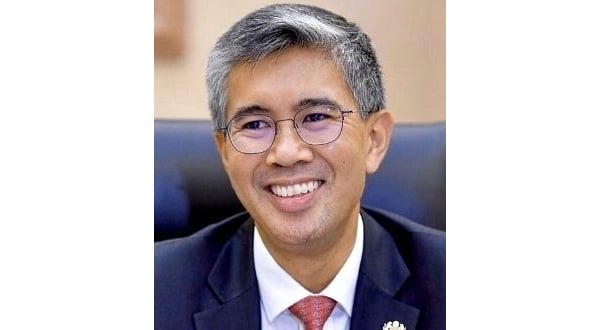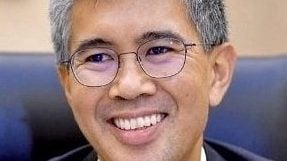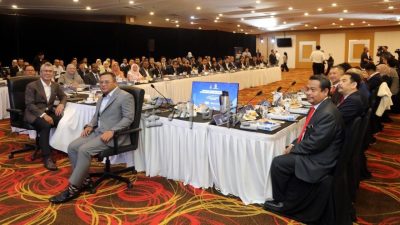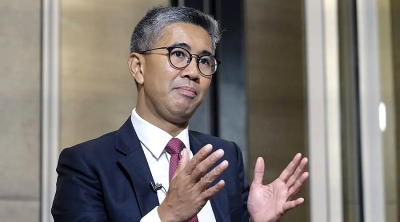
The return of political stability with the formation of the Unity Government a little over 100 days ago, and the bleak prospects in many markets have placed Malaysia back on the radar of the foreign business and investment community.
This is evident especially during my visits abroad to promote Malaysia since being appointed the Minister of International Trade and Industry in December 2022.
From Jakarta to Davos, Abu Dhabi to Milan, and most recently, Singapore and Seoul for trade and investment missions, we were met with renewed interest by current and potential investors.
The goodwill is still evident and many international investors have, for many years, wished for Malaysia to again be one of the top performing economies in ASEAN, instead of a sliding mid-table nation in the region.
Thankfully, Malaysia’s stellar economic performance of 8.7% GDP growth for 2022 – the highest in ASEAN last year – together with a low unemployment rate of 3.6% in December 2022 and low headline inflation of 3.2% despite global inflationary pressures, mean that we must be taken seriously.
These numbers also validate the effectiveness of many of our pandemic policy responses and aid measures.
Whilst some of the international businesses do reminisce about the good old days of the low-cost manufacturing ecosystem, they do understand that this is not sustainable in the long run. Further, given the global inflation and disrupted supply chains that have increased costs, we must work hard to enhance the positive considerations of operating in Malaysia.
This is where MITI, together with our agencies, have our reform priorities cut out for us.
Since joining MITI, I have repeatedly stressed to MITI officials and its agencies that we must rethink our strategic approach to align trade, industrial and investment policies if we want to unlock future growth and set our economy on a more sustainable path.
Besides our trade figures (which matters a great deal because Malaysia is a trading nation), what is also at stake is the future of our SMEs, better-paying jobs for countless Malaysians and the well-being of their families: these are our overarching KPIs.
To that end, we have been guided by our priorities, the key ones of which are:
Firstly, to increase trade growth and ensure an inclusive and sustainable global trade environment.
When it comes to Free Trade Agreements (FTAs), feedback from all segments of society – government, private sector, civil society and individuals – will be taken into account when conducting cost-benefit analyses.
This facilitates more efficient decision-making and ensures the FTAs’ benefits are aligned to our socio-economic priorities such as supporting SMEs, closing rural-urban gaps, and fostering gender empowerment.
In short, our people remain our top priority in new FTA negotiations, including the RCEP and the CPTPP, where we have worked closely with our traditional as well as new trade partners.
Secondly, ESG and digitalization are key to future-proofing our industries, especially the SMEs.
Disregard ESG and our exporters’ market access and businesses will suffer. To prevent that, MITI is currently crafting the National Environmental, Social and Governance Industry Framework (i-ESG), for the manufacturing sector to adapt to ESG.
This comprises four components, namely standards, financial support and incentives, capacity building, and market mechanisms, including carbon trading and carbon pricing.
On digitalization, I once did an interview on RTM, where they had also invited the founder of Claire Organics, Ms Louise Chu, a government grant recipient who successfully digitalized and expanded her business during the pandemic.
There are many MSMEs like her who must be supported digitally to scale up, or to partake in the green economy, because these MSMEs contribute 37.4%1 to our GDP and employ 47.8%2 of Malaysia’s working population.
Our future economic expansion will also depend on our MSMEs’ ability to secure and adapt to green technology.
Thirdly, we must attract high-quality investments that create jobs and encourage re-investments.
The global economy is changing fast, and competition for FDI within ASEAN is intense, so we must create a super-conducive environment, particularly for the focus industries in our New Investment Policy (NIP), i.e., higher value E&E, Medical Devices, Pharmaceuticals, Digital Economy, Aerospace, and Chemicals, as well as sectors such as EV, data centers and food security.
We are also determined to move Malaysia up the value-chain in manufacturing and services, which is vital for us to transition to a more tech advanced economic model, with a higher complexity.
Fourthly, MITI must ensure that Malaysia regain its glory as the investment destination of choice in Southeast Asia.
Since December 2022, my team and I have been busy positioning Malaysia as stable, pro-business, pro-investments, and pro-trade. But we know these promises must be substantiated by real policy reforms, and the ease of doing business.
These include the proposed creation of a One Stop Centre via the MITI e-Gov platform; reforming the Halal certification process; creating a competitive industry and services ecosystem; ensuring a robust talent pipeline for key sectors; and appropriate skilling, reskilling and upskilling programs for industries’ HR needs.
I have also repeatedly emphasized the need to set appropriate KPIs and monitor outcomes of key projects. For example, on FDI and DDI received, we must religiously track, among others, the number of jobs created, tax revenue generated, ESG compliance level and the CSR contribution to surrounding communities.
On improving the ease of doing business, we must identify and resolve the pain points track in the investors’ journey, from the decision to invest, right up to the operationalization of their facilities and beyond.
I personally do not perceive a 24-month gestation period between decision-making and operationalization as acceptable.
We can and must do better if we want to keep attracting and retaining high quality investors!
The logic is simple: investments create economic activities, which create business for SMEs and jobs for our people. For example, the RM264.6 billion that Malaysia attracted in approved investments for the year 2022 are expected to create 140,370 new job opportunities, jobs which pay a decent wage.
With a highly capable team at MITI and its agencies, appropriate strategies and properly monitored execution, I am confident Malaysia can achieve so much more in nurturing industry, expanding trade and attracting investments.
Some of our early efforts are already bearing fruit, through confirmed commitments from major MNCs such as Tesla, Intel Corp, Amazon Web Services, Shopee’s parent – Sea Ltd, the Yondr Group, INSEACT, Samsung Engineering, SKC, Lotte Fine Chemicals, Hyundai, COWAY, Lotte Energy Materials and POSCO Holdings in the last couple of months. Gaining commitments from these major MNCs validates our belief in Malaysia’s huge potential.
For MITI, this is only the beginning, so watch this space!
- For 2021. Source: DOSM
- For 2021. Source: DOSM
(Tengku Zafrul Tengku Abdul Aziz is the Minister of International Trade and Industry, Malaysia.)
ADVERTISEMENT
ADVERTISEMENT







































